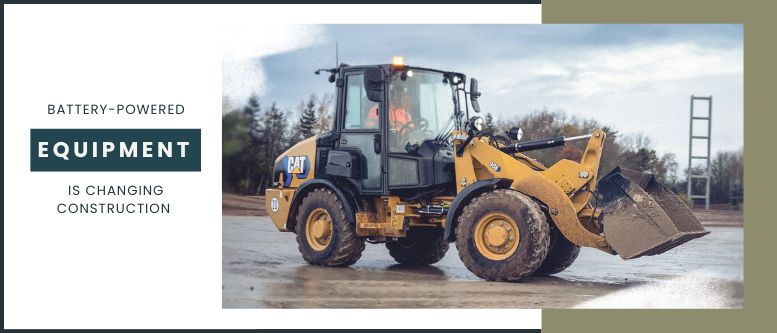A silent revolution.
Article written by Tom Swaczyna. Tom is a mechanical engineer and writer who has a talent for breaking down complex topics into clear, engaging content. He brings fresh perspectives to tech and innovation, making it accessible and intriguing for industry experts.

Diesel is dead.
Diesel heavy equipment has earned a reputation for being a bit of a nuisance, albeit needed. Heavy equipment would roar into under-developed pieces of a neighborhood, plumes of smoke would appear, and let’s not forget the endless BEEP, BEEP, BEEP. Add in the dust, and the construction roadblocks, and it’s no wonder we silently groan when it’s around.
With all that ruckus, something spectacular would emerge. It’s fair to say all these problems won’t be solved in one fell swoop, and some will always exist as is the nature of the construction world.
The industry is turning a corner, with the help of battery-powered equipment, heavy machinery is moving towards a cleaner and quieter future, and as a result, our blood doesn’t boil as much.
Let’s take a closer look.
Zero emissions
Diesel-powered equipment has traditionally been common on construction sites, yet it carries the burden of high emissions that contribute to air pollution and global warming. With growing concerns over air quality and climate change, emissions are under increasing scrutiny. Battery-powered equipment offers an alternative, emitting no pollutants on-site.
Why is this a big deal?
Utilizing clean machinery allows contractors to operate in urban and environmentally sensitive areas without causing ecological harm. Battery-powered tools are particularly beneficial in indoor or restricted areas such as basements, warehouses, and tunnels, where ventilation is minimal. Adopting eco-friendly machinery not only meets environmental guidelines but also distinguishes your brand as a pioneer in sustainable construction practices.
Lowering maintenance and operating costs

Maintaining diesel engines can be expensive due to high fuel costs and the need for regular servicing. Additionally, diesel machinery is prone to breakdowns over time, particularly with intensive use, leading to increased project downtime. In comparison, battery powered equipment, with its fewer moving parts, offers simpler and more economical maintenance. This eliminates concerns about oil changes, filter replacements, and typical diesel wear and tear.
Battery-powered equipment not only eliminates fuel expenses, which is a significant advantage for contractors aiming to enhance their profitability but also benefits from the substantial advancements in battery technology. Modern machines can now operate for extended periods on a single charge, frequently lasting an entire shift before requiring recharging. Moreover, with the growth of renewable energy sources, some projects are adopting on-site solar or wind power to recharge batteries, thereby reducing energy costs even more.
Switching to electric machinery, contractors can save significantly on both maintenance and fuel costs while reducing downtime, which ultimately boosts productivity and project efficiency.
Good-bye noise pollution
One of the biggest complaints from residents and communities near construction sites is the noise. Heavy machinery is loud, disruptive, and can even cause hearing issues for workers. Battery-powered equipment is a lot quieter, operating at a fraction of the noise level compared to traditional machines. This is a game-changer for projects in residential or urban areas where noise restrictions are often in place, and it’s ideal for night-time work or early morning shifts without waking the neighbors.
However, the benefits of reduced noise go beyond neighbor relations. Lower noise levels on the job site create a safer, more productive environment. Workers can communicate more easily, reducing misunderstandings and improving job site safety. The reduced sound footprint also helps operators stay more focused, as they don’t have to contend with traditional engines’ constant hum and vibration. A quieter site enhances worker’s wellbeing and keeps them more alert, reducing the likelihood of accidents.
Battery technology is not only cleaner and quieter but also becoming more economical. Battery-powered machinery provides the industry with an opportunity to construct sustainably and responsibly.
Also read, The top 5 construction machines of 2024
One last thing
Please support Fused Equipment, by leaving a comment on this article.
Follow Fused Equipment on LinkedIn and Facebook to stay updated on the latest happenings.
Have a question about this article or want to get in contact with a rep to discuss battery machinery? Contact us.

